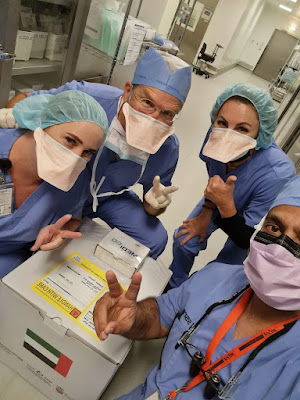I spent a week in the UAE this summer, in connection with a three-pair kidney exchange between the UAE and Israel. (The UAE is a natural hub for kidney exchange, something I'll say more about in subsequent posts.) Because there were some sensitivities about how it would be publicized, I've refrained from blogging about it until now, but yesterday's front page story in USA Today met with just about everyone's approval, and so over the next few days I'll post some observations. Today I'll start with the USA Today story, which is gated, but can also be found ungated on Yahoo, here:
How three Jewish and Arab families swapped kidneys, saved their mothers and made history by Marco della Cava, USA TODAY, Wed, September 29, 2021 AM
"At a time when the world seems rife with division and discord, what happened on July 28 reminds how mutual survival often depends on shared humanity triumphing over historical differences.
"In this case, with the assistance of organ transplant experts in the United States, Israel and the United Arab Emirates, three pairs of kidney donors and recipients in Israel and the UAE saved each other in a series of choreographed, pay-it-forward surgeries known as a cyclic exchange.
...
"Just consider the logistics involved in the UAE-Israel exchange. A UAE daughter who was not a match for her mother volunteered to give her kidney to a stranger. An Israeli Arab woman was a match for that kidney, so her husband agreed to donate his kidney to save an Israeli Jewish mother – whose daughter in turn gave her kidney to the sick mother in UAE.
"“The reason we are excited about this is simply because the bigger the pool, the more likely you are to find matches,” says Dr. Michael Rees, a surgeon and founder of the Alliance for Paired Kidney Donation, a Toledo, Ohio-based nonprofit instrumental in making this politically groundbreaking kidney transplant chain a reality.
...
"Those communications, however, remain politically sensitive. When asked for comment, officials in the UAE focused less on the partnership with Israel and more on a general need for international cooperation.
"We are pleased that our innovative partnership with the Alliance for Paired Kidney Donation has allowed us to help our patients,” says Dr. Ali Al Obaidli, chairman of the UAE National Transplant Committee. He added that a collaborative spirit between countries can be used to “close the gap” for those in need of kidneys.
"The UAE donor daughter and recipient mother asked not to be identified by name or religion. Conversations with those involved in the cyclic exchange say kidneys donated outside the UAE generate negative reactions among some Emirati.
...
"This unique transplant chain began when the 60-something mother in the UAE found out in fall 2020 that she had kidney failure and would soon need to start dialysis or find a new kidney.
"Because her family members were not matches, Rees and his Alliance for Paired Kidney Donation team got to work finding a match, which also involved seeing where her daughter’s donor kidney might go.
"The first step was to plug all the relevant medical details into an algorithm ...
"Also crucial to the process was Roth's Israeli colleague Itai Ashlagi, who had developed software that could instantly mine his native country’s kidney database. While Israel had started to develop transplant relationships with Austria and the Czech Republic, he was excited about this new involvement with the UAE.
“Better to exchange kidneys than bombs,” says Roth, adding that using computers to search the world for medical solutions radically increases the chances of patients getting help. “International boundaries are artificial markers. Kidney disease doesn’t care about that.”
**************
Here's the picture on the USA TODAY front page: Tamar Ashkenazi flew from Israel to UAE with an Israeli kidney, and flew back with the UAE kidney...
************
Here's a USA Today 1-minute video collage of pictures and video accompanying the story:
Daughters from the UAE and Israel put differences aside to save lives in kidney exchange. Three pairs of kidney donors and recipients in Israel and the UAE saved each other in a series of pay-it-forward surgeries known as a cyclic exchange. by Harrison Hill, USA TODAY
I'll have more to say soon, and will link back and forth between posts to make the whole story accessible.




















